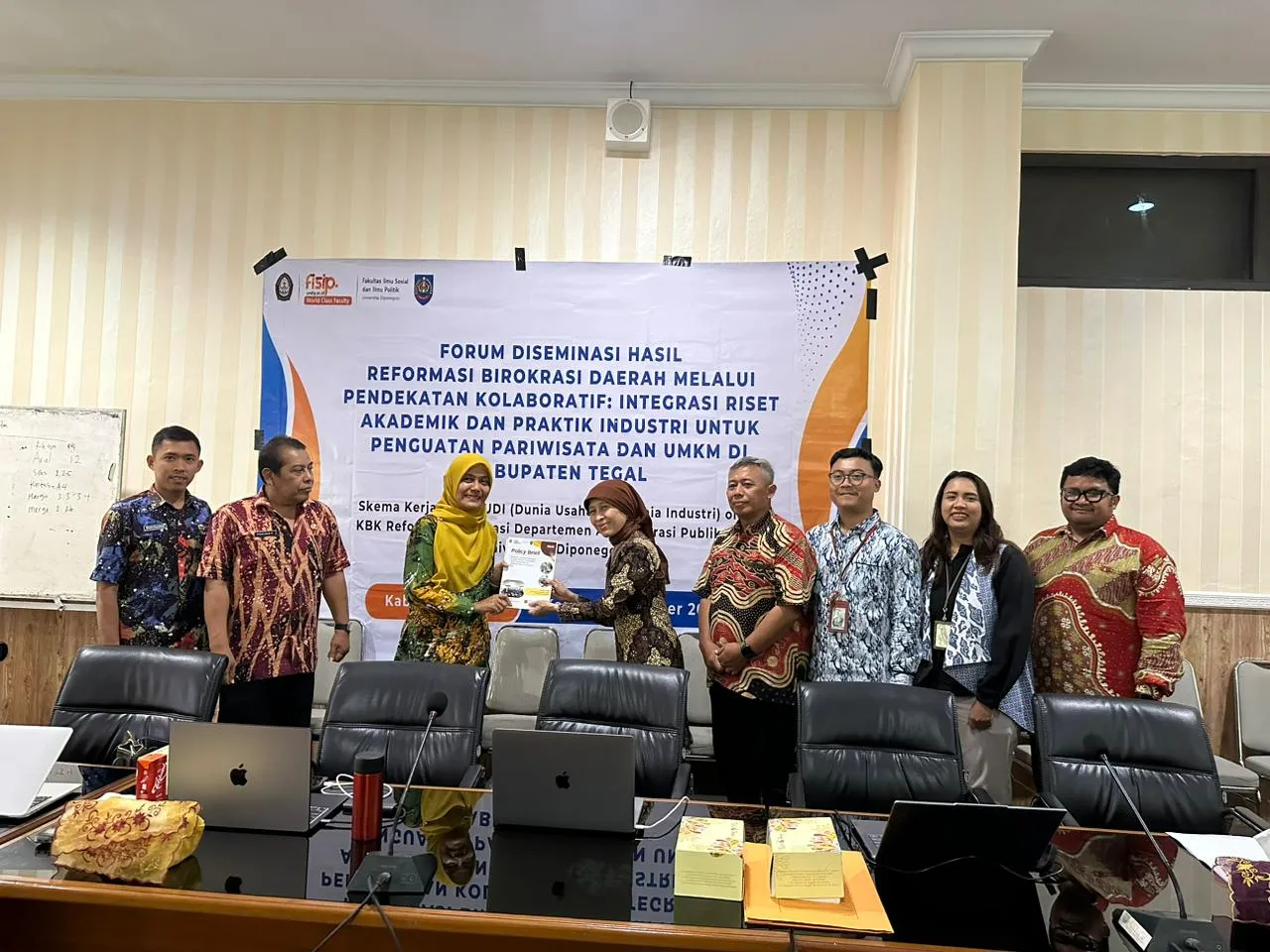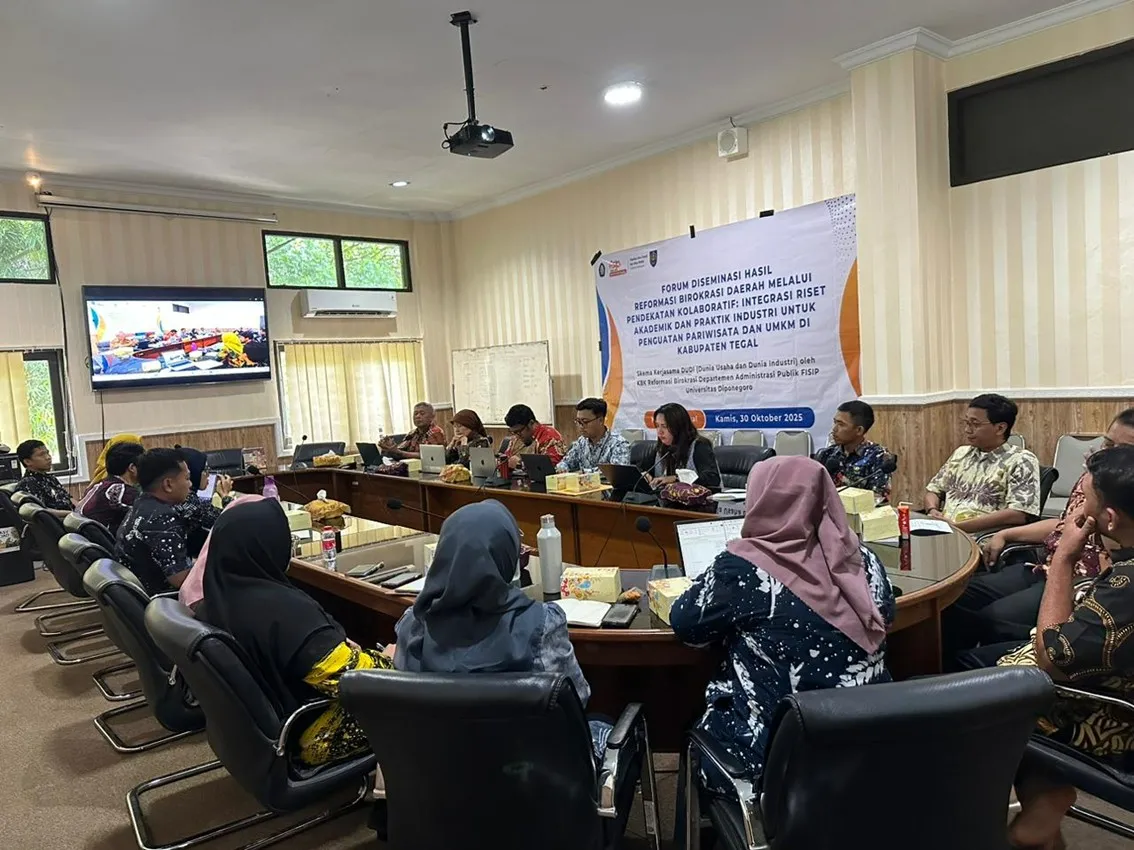Tegal Regency, October 30, 2025 — The Faculty of Social and Political Sciences, Universitas Diponegoro (FISIP Undip), through the Bureaucratic Reform Academic Expertise Cluster of the Department of Public Administration, in collaboration with the Regional Development Planning, Research, and Development Agency (Bappeda Litbang) of Tegal Regency, held a Dissemination Forum on the Results of the Academia–Industry Collaboration (DUDI) under the theme “Regional Bureaucratic Reform through a Collaborative Approach: Integrating Academic Research and Industrial Practice for Strengthening Tourism and MSMEs in Tegal Regency.”
The event, held at the Bappeda Litbang Office of Tegal Regency, marked the culmination of a collaborative research series that produced two strategic documents: an academic paper on the integrated MSME data collection method of Tegal Regency and a policy brief containing actionable recommendations to strengthen MSME data governance at the regional level.

Figure 1. The Bureaucratic Reform Academic Expertise Cluster (KBK Reformasi Birokrasi) of FISIP Undip presented the Academic Paper and Policy Brief to the Tegal Regency Bappeda Litbang as part of the Academia–Industry (DUDI) collaboration program.
Addressing the Challenges of Local Bureaucratic Reform
Bureaucratic reform in the digital era requires data-driven, participatory, and collaborative governance. One key challenge in Tegal Regency is the suboptimal management of data on Micro, Small, and Medium Enterprises (MSMEs), the backbone of the local economy.
Through this joint research, FISIP Undip and Bappeda Litbang Tegal developed an integrated MSME data model that aligned with the One Data Indonesia policy. This model serves as an evidence-informed policy instrument to enhance the planning, budgeting, and evaluation of MSME empowerment programs.
FISIP Undip’s Commitment as a World Class Faculty
In her remarks on behalf of the Dean of FISIP Undip, Dr. Dyah Lituhayu, M.Si., as Chair of the Bureaucratic Reform Academic Expertise Cluster, emphasized that the activity reflects FISIP Undip’s commitment as a World Class Faculty focused on delivering tangible impacts for society and local government.
“FISIP Undip remains committed to realizing the university’s tridharma—education, research, and community service—that is relevant, innovative, and directly beneficial to the public. Our collaboration with Tegal Regency Bappeda Litbang is a concrete example of how universities can act as catalysts for change—bridging academic knowledge and public policy practice,” Dr. Dyah said.
She further highlighted that data are more than just numbers; they are the foundation of effective and equitable decision-making.
“Through the development of this integrated data collection method, the Tegal Regency Government now has a strong scientific framework for formulating evidence-based policies. This is the embodiment of ‘Undip Valuable and Undip Noble’—where academic research is implemented to address real societal and regional challenges,” she stated.
Appreciation from the Regional Government
Separately, the Head of Bappeda Litbang Tegal Regency, Muhammad Faried Wajdy, S.Sos., M.Si., expressed his high appreciation for FISIP Undip’s contribution to promoting a more adaptive and data-driven bureaucracy.
“We truly appreciate FISIP Undip and the Bureaucratic Reform Research Group for being strategic partners of the Tegal Regency Government. The academic approach offered not only strengthens the scientific foundation of policy-making but also helps us build a more measurable and sustainable MSME data system,” said Faried.
He further emphasized the importance of cross-sector collaboration in addressing the challenges of regional data governance.
Synergy Among Academia, Bureaucracy, and Industry
The forum was attended by regional officials, including representatives from the Department of Cooperatives, MSMEs, and Trade, and the Department of Youth, Sports, and Tourism of Tegal Regency, along with the Bureaucratic Reform Academic Expertise Cluster: Dr. Dyah Lituhayu, M.Si.; Dr. Slamet Santoso, M.Si.; Satria Aji Imawan, MPA; Damaris Bernike Bellastuti, M.A.; and Yoga Aldi Saputra, MPA.

Figure 2. The Dissemination Forum on the Academia–Industry (DUDI) Collaboration Results between FISIP Universitas Diponegoro and Tegal Regency Bappeda Litbang, held at the Bappeda Office.
The forum served as a vital platform for stakeholders to discuss research outcomes, validate policy recommendations, and design follow-up steps to build a more adaptive, transparent, and inclusive bureaucracy in the future.
Through this DUDI collaboration, the Bureaucratic Reform Academic Expertise Cluster of FISIP Undip plays an active role in connecting the academic world with the government and industry. The model developed through this partnership is expected to become a replicable best practice for other regions seeking to implement evidence-based governance and enhance local economic competitiveness, particularly in the MSME sector.




0 Comments